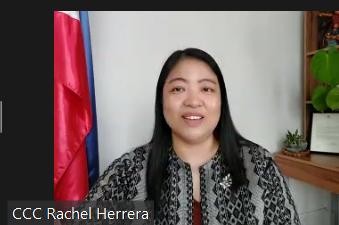
September 27, 2021 Monday

MANILA, 28 September 2021 – The Climate Change Commission welcomed the establishment of the ASEAN-China Mangrove Eco-corridor and called for stronger cooperation on climate action across different sectors and across countries in the region during the NGO Forum, one of eight parallel forums of the Fifteenth Meeting of the Conference of the Parties to the Convention on Biological Diversity (CBD COP 15), held in Kunming, China on Monday, September 27.
Commissioner Rachel Anne Herrera, who participated virtually and gave the sub-forum’s opening address, said the Philippines “welcomes and lauds the establishment of an ASEAN-China Mangrove Eco-Corridor.”
“Mangroves form a “first line of defense” that protects our inland and coastal communities especially during typhoons. In terms of climate mitigation, mangrove ecosystems also have immense carbon sequestration potential, compared to many forest ecosystems,” Herrera explained.
“As long as mangrove restoration activities align with science to use the proper native species, site selection, and nursery management, and engages in a transparent manner with stakeholders, these are no-regrets, high-impact measures that benefit any community,” she added, noting that mangroves in China, India, Mexico, the US, and Vietnam avert as much as 57 billion USD in flooding damages per year.
In his opening address, China’s Special Envoy for Climate Change Affairs and Global Climate Action Initiative Co-chair Xie Zhenhua also emphasized the importance of nature-based solutions, which “rely on the power of nature to address climate risks through ecological conservation, restoration, and management.” Xie likewise emphasized the important role of the region in mangrove conservation.
“The ASEAN-China region, with coverage of more than a third of the world’s mangrove areas, or over 4.3 million hectares, is the largest mangrove forest area in the world,” Xie said. He lamented, however, that difficulties in conservation persist because of continued conversion of mangrove forests to aquaculture ponds, agricultural expansion, and charcoal production, among others.
While noting that China and ASEAN member-states are all developing countries that face challenges in balancing economic development and mangrove conservation, he emphasized that the region has been actively cooperating on the issue for several years through dialogues, exchanges, experience-sharing, and collaboration.
“Such regional cooperation can play a crucial role in global mangrove and marine biodiversity conservation, sustaining the livelihoods and well-being of coastal communities, climate change mitigation and adaptation, and the achievement of regional sustainable development,” Xie said.
The parallel forum was hosted by the Global Climate Action Initiative, the ASEAN-China Centre, and the China Environmental Protection, and was organized by the Global Environmental Institute, the Society of Entrepreneurs and Ecology Foundation, and the Mangrove Conservation Foundation.
ASEAN-China Centre Secretary General Chen Dehai and Dr. Chen Guangchen, Researcher of the Third Institute of Oceanography, Ministry of Natural Resources of China, gave the forum’s keynote speeches. This was followed by a roundtable discussion on the status and conservation gap of ASEAN-China mangroves, with Department of Environment and Natural Resources Biodiversity Management Bureau's Director Datu Tungko Saikol sharing ongoing efforts of the government on mangrove conservation and rehabilitation and identifying gaps that hinder effective implementation of the country's initiatives; case study discussions on community-based conservation in Myanmar, mangrove protection practices in Indonesia, and the work of NGOs in China on mangrove protection.
In their addresses, both Xie and Herrera emphasized the importance of stronger cooperation not just across countries in the region, but across all sectors.
“Ecosystem conservation and addressing climate change require cooperation of all sectors of society, including central and local governments at all levels, as well as businesses, non-governmental organizations, and research institutions,” Xie said.
“One government, one region alone cannot implement the interventions needed and succeed. We will need to sustain and strengthen public-private partnerships, and tap civil society, academia, and other development partners so that our plans can be realized by more individuals and communities,” Herrera said, citing as a primary example, the work of the ASEAN Centre for Biodiversity as pivotal to the region’s whole-of-community approach to the cross-cutting issues of biodiversity loss and climate change.
Herrera also expressed hope that cooperation through the eco-corridor initiative will carry over to the other shared issues in the region.
“Cooperation on this front can help our region and China move towards a resilient recovery from the global pandemic,” she said.
“We hope this initiative will also strengthen and intensify ASEAN-China cooperation on the many other areas of concerns in the region, and bring about similar solutions to growing problems like plastic pollution, marine litter, and solid waste management,” Herrera concluded.